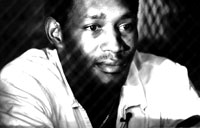Supreme Court ruling too late for many
By
Gloria Rubac
Houston
Published Mar 9, 2005 3:31 PM
The U.S. Supreme Court has
finally bowed to mass and world pressure and outlawed the execution of people
for crimes committed when they were minors. While many are rejoicing, this move
comes too late for too many.
Since 1642, the U.S. has executed at least
366 persons for offenses they committed as juveniles. The youngest was James
Arcene, a Native child who was 10 years old at the time of his alleged crime.
Since World War II, the youngest was a 14-year-old African American, George
Stinney, who was so small that the oversized mask fell off his face while he was
being electrocuted by the state of South Carolina. He weighed only 95
pounds.
Since the death penalty was reinstated in 1976, 22 juveniles have
been executed, all in Southern states, 13 of them in Texas. Of the 22, half were
African American.
Who were some of these children who were
killed?
Napoleon Beazley graduated with honors, was president of his
senior class, a star athlete, and active in his church in the small town of
Grapeland, Texas. He had no criminal record. Yet, succumbing to peer pressure,
he was involved in a car jacking that ended in murder. Because of his
background, activists felt his case was perfect to show that juveniles deserve a
chance to live and rehabilitate themselves. However, Beazley was executed by the
state of Texas on May 28, 2002.
Almost 100 people protested Beazley's
execution. Afterward, his family greeted supporters and spoke with the media.
His parents, Rena and Ireland, his sister Maria and his brother Jamaal had stood
by Beazley. They fought until the end, doing radio and television shows,
speaking to rallies and urging people to contact the governor.
Glen
"Mookie" McGinnis, a gay African American youth, dropped out of high school in
10th grade. He had a difficult childhood. His mother had drug problems and was
in and out of prison. His grandmother raised him. At 17 he robbed a dry cleaners
and shot the owner.
Two weeks before he was executed, CNN asked McGinnis
if the death penalty was a deterrent to crime. "I didn't even know the death
penalty existed when I was arrested. I was living on the streets, living day to
day, trying to breathe. Death penalty? It was on the streets, all the time. I
saw it every day where I grew up. But if I knew about a death penalty from the
papers or TV, it passed me by. ... But now I think about my execution all the
time, all the time." When he was executed on Jan. 25, 2000, he was 27 years
old.
Perhaps the best-known juvenile was Shaka Sankofa. This year will
mark the fifth anniversary of his execution.
Sankofa was born Gary Graham
to an alcoholic father, Willie Graham, and a mentally ill mother, Thelma
Griffin. He was raised by his father and his stepmother, Elnora Graham, in an
oppressed community in Northeast Houston, amid extreme poverty. Although his
parents and stepmother loved him dearly, life was difficult. He recalled as a
young child having to chase and drag his mentally ill mother home when she took
off down a neighborhood street totally nude, while neighborhood children laughed
at her.
In 1981, he was arrested for robbery and soon afterward charged
with the murder of a known drug runner--a charge he always denied. After his
court-appointed attorney, Ron Mock, gave him absolutely no defense, Graham was
sent to Texas death row in 1981. During his 19 years of confinement, Graham
educated himself, evolving from a street kid to an educated man and a
revolutionary. He participated in political education on the row, organized
hunger strikes, and started a death-row newspaper called Endeavor, which had a
circulation of thousands around the world. He abandoned his slave name in 1995
and became Shaka Sankofa.
By the time of his June 22, 2000, execu tion,
Sankofa had supporters on every con tinent, from movie stars to civil rights
leaders to Catholic nuns to members of the British parliament and the Texas
legislature.
But his truest supporters were those African Americans who
saw Sankofa as one of them.
Almost 3,000 people gathered in Hunts ville on
June 22, 2000. His stepmother and daughter, as well as Bianca Jaggar, Al
Sharpton and Jesse Jackson, were joined by thousands who hoped against hope that
then-governor George W. Bush would do the right thing.
Just as Bush has
today become the occupier and executioner of the Iraqi people, he executed 152
people while governor of Texas. He didn't care that because of the
Anti-Terrorism and Effective Death Penalty Act, signed by President Bill
Clinton, no court anywhere had ever heard the real evidence in Sankofa's case.
He decided that the movement to free Sankofa could not be allowed to
succeed.
Lying on a gurney awaiting the needle, Sankofa said, "Know that I
love all of you for your blessing and strength, for your courage, for your
dignity, the way you have come here tonight, and the way you have protested.
Keep moving forward. Slavery couldn't stop us. The lynchings in the South
couldn't stop us. This lynching will not stop us tonight. We will go forward.
Our destiny in this country is freedom and liberation. We will gain it by any
means necessary."
Articles copyright 1995-2012 Workers World.
Verbatim copying and distribution of this entire article is permitted in any medium without royalty provided this notice is preserved.
Workers World, 55 W. 17 St., NY, NY 10011
Email:
[email protected]
Subscribe
[email protected]
Support independent news
DONATE


